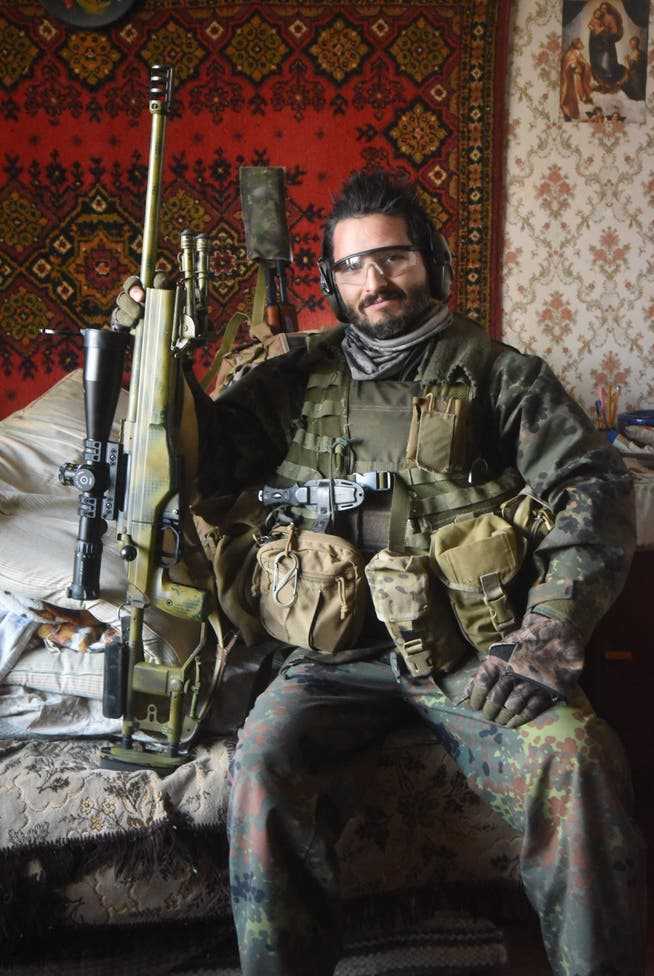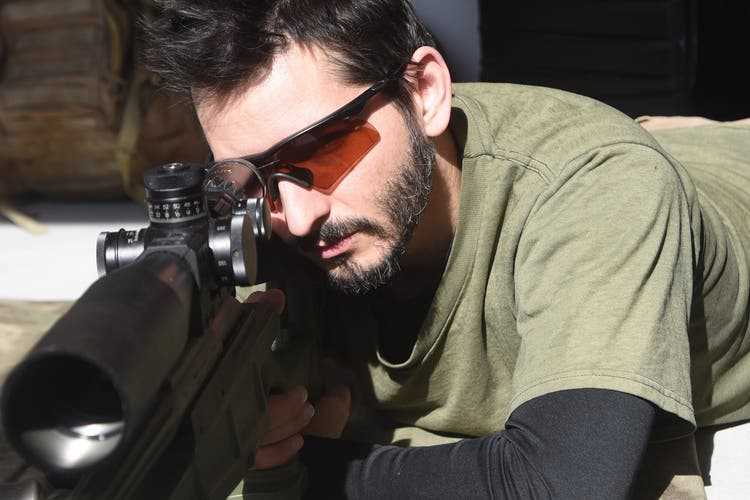Wali is a father and programmer. But the Canadian still has a second life: As a sniper, he fights alongside the Ukrainians – and was made a legend by them.
The Canadian sniper Wali, that is his war name, became a legend in the Ukraine war.
It was in Afghanistan, in a village called Salawat, when Wali shot someone dead for the first time. It was 830 meters to the target, an average distance for a sniper. The enemy was on the move. “The shot was good. I’m very proud of it,” he says. But Wali had killed before. Not directly, he didn’t pull the trigger himself, but as a spotter. That’s what the observer is called, who lies in a position next to the sniper, views targets and calculates data for a possible kill. “I make no difference whether I’m on the trigger myself or give the command.”
His first fatal shot as a spotter was also in Afghanistan. “I counted out loud: five, four, three, two – and in that moment I realized: Now you’re killing this person.” What then happens is always the same: the shot is fired, dust whirls up, the target collapses. «Modern war is simple. The hardest part is the decision.”
That was in 2009. Today, Vali is a war hero, a living legend, fighting alongside the Ukrainians against the Russians. He is 40 years old, he keeps his real name secret, he has kept his war name. Thousands follow his blog “La Torche et l’Épée” (“The Torch and the Sword”) on social media. The Ukrainians celebrate him as the “deadliest sniper in the world”, killing 40 to 60 Russians a day. Western media adopt the narrative, as do the reports about his world record: he is said to have shot an IS fighter in Kurdistan from a distance of 3,400 meters.
Photos of his departure from Montreal Airport are circulating. The excitement about his use is reminiscent of a transfer coup like in football. The Ukrainian soldiers wanted to be photographed with him at the checkpoints. A Tiktok video from a Ukrainian account promoting the sniper’s records with heroic music has gone viral. Only: The records, the stories of dozens of Russians killed – they are not true.
“If we fought against NATO, I would have been dead long ago”
Vali, in a green camouflage suit, with a kepi and a dark beard, is sitting by a window “somewhere in the Kyiv region” when he talks about the past few weeks via video call. His face is unremarkable, he could come from anywhere and nowhere. In Afghanistan he was mistaken for a Talib, in Ukraine for a Chechen. «It can be practical. At the same time, you’re always somehow suspicious.”
Back home in Canada, Wali is a family man and programs cryptocurrencies. In his other life he is a sniper. In the past few days, he is allowed to tell, he fought in Irpin and in Bucha. But not even his wife knows his current whereabouts.
After the hard struggles of the past few weeks, there is now an eerie silence. No fighting, no rocket attacks, not even alarm sirens. “Actually, it’s pretty boring right now,” says Wali. “A good sign in war.”
When the Canadian reports on the past few days, he seems sober, almost relaxed. “I like to compare myself to a surgeon: he operates, deals with life and death and still reports over lunch about the TV series he is watching.” In the background, a Ukrainian soldier waters plants and jokes with his colleagues. Wali is one of two remaining Foreign Legionnaires in his unit. You are part of a Ukrainian battalion. “The pressure at the front is huge. The load literally crushes you. Many have come back crying.” He can handle the pressure himself. He doesn’t have nightmares, and he can even sleep with grenades exploding next to him.
In recent weeks, Wali herself has narrowly escaped death several times. Once they were surrounded by Russians in a residential building and came under fire. “This thing just missed me by two meters,” he says, holding a cartridge almost the size of his forearm up to the camera. “The fights are very brutal. The Russians shoot projectiles all day long.” In contrast to NATO, the Russians have a significantly less strategic, but primitive fighting style. “If we fought against NATO, I would have been dead long ago.”
In fact, Wali was declared dead on the internet two weeks ago. He responded in the form of a photo showing him lying in battle gear in a children’s ball pit: “I’m alive.” Wali is the subject of war propaganda – on both sides. While the Russians declare him dead, the Ukrainians create the image of the ruthless sniper.
“I’m not a killer,” he says, who voluntarily goes into a foreign war with his gun. What he means by that: “I don’t kill carelessly, not for the sake of killing.” Again and again he clears up rumors and false reports on his blog and in interviews. And as is so often the case in this war, most of his statements cannot be independently verified.
Is the “world’s deadliest sniper” nothing but propaganda?
A sniper is not what Hollywood movies make it seem. “It’s actually quite boring,” says Wali. He usually looks at the same building, at the same window for hours, until something happens. If something finally moves hours later, he has to be sure that it’s not civilians. These often moved like soldiers. “When in doubt, I don’t shoot. Actually, almost always.”
When asked how many people he has killed, Wali says it depends on what the definition of killing is. And it seems as if this distinction ultimately serves one’s own conscience. He has only shot someone with a sniper rifle twice in his career. As a soldier, however, you have more people on your conscience from other attacks, in which wild shots are fired. It doesn’t matter who actually died from whom. “Modern war means you push a button and people die. It’s more personal as a sniper because you’re watching the death directly through the lens. But at the end of the day, you’re just pressing a button.”

Vali (here on duty in Ukraine) became the subject of war propaganda – on both sides.
But he doesn’t want to know anything about the 40 Russians a day he’s supposed to kill. “Some even attest that I shoot too little.” Wali doesn’t hold a world record either. This was scored during his time in Kurdistan, but by a different sniper. “I don’t care who that was. But it wasn’t me.” It is also not desirable to shoot as far as possible as a sniper. The greater the distance, the more luck it takes. Something not to be trusted in war. «As a sniper, you try to get as close to the target as possible. I assume that in this case he had no other choice.”
So is the “world’s deadliest sniper” a pure product of propaganda? “They are half-truths,” says Wali. In Quebec, where he comes from, he was already known before the Ukraine assignment. He has gained a lot of wartime experience as a sniper, especially in Afghanistan. That’s where his pseudonym came from. He started blogging, wrote books about his missions and appeared in documentaries. But his figure was exaggerated by the pro-Ukrainian propaganda. Because wars need heroes. ‘Of course I’m a good soldier. I’m an excellent observer and sniper,” says Wali. But he’s not cold-blooded.
Go to war to feel alive
So why does a person like Wali, who leads a peaceful and secure life at home, even think of going to war with someone else? “Because I can do something. I can’t say no if I could actually help,” he says, referring to Volodymyr Zelensky’s request for support from foreign soldiers.
A commitment out of a pure sense of duty, even charity – you don’t want to believe him completely. Then the sniper becomes self-critical: “I have a good life: I have a family, money, a job. And yet I get dissatisfied, moan about trivialities – except when I come back from the war,” says Wali. And suddenly the war seems to have a completely different meaning for Wali. It is a break out of the tedium of an orderly everyday life. He admits: “In a way, I feel more alive again.”
When Vali recently traveled to Kyiv by train, his son was celebrating his first birthday. In the pitch-dark train, he took part in the celebration in combat gear via video. His son was very excited. A few moments passed before he put his head close to the screen. “It takes longer and longer for my son to recognize me. The sad truth is, if I die here, my son won’t remember me.”
But the thought that his son could one day go to war himself shudders him. “Now that I see how much you invest in one person: time, money, education, love – and then in a few seconds your story ends . . .» He pauses. “Every Russian we shoot was once a baby like my son. War is nothing but a waste.”
He does not know when Wali will see his son again. “I’ll go back when I think I’ve done my duty.” Just a few hours after the conversation, Wali will write that the fighting continued.
Ukraine still needs its war hero. The hype surrounding his person flatters him. “But in a few months I will be forgotten here. And then I’ll be a normal man again.” A father of a family, back in his tranquil life in Quebec – until he might start whining about trivialities again.

